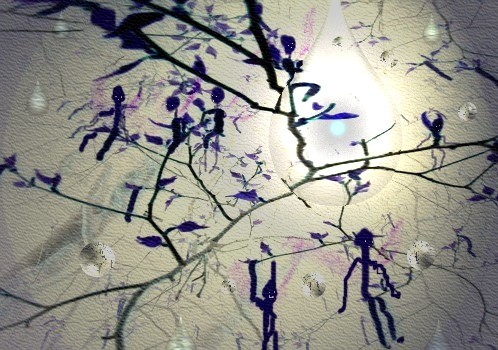
art by Melissa Mead
The Butcher's First
by Seth DeHaan
Our home always smelled like blood.
My father spent his days among meat and his nights ensconced in the aromatic mist of it. We lived above the shop--he and me, Mother and my sister Fennel--in three small rooms built of knotted pine, boards stained in the colors of our livelihood.
I was apprenticed at nine and a competent butcher at thirteen, handling flanks, shanks and the various tender parts of our animals with ease. The day the first ships crashed, spiraling down into the towers and alleys of London, I was up to my elbows in a pig's innards, grasping after the choice cuts. Fennel came home from the mill holding a pocked and pitted chunk of metal, "sheared clear off against the street outside Standfast's estate," she said.
Wiping hands against his apron, my father brought the weight of it up to his nose, inhaled deeply. His thick eyebrows furrowed. "Out of the sky?"
"Yes, sir. All over the city, like big metal boats washed ashore."
He shrugged, let the otherworldly plating fall to thud against the counter. "King George'll see to it. We have sides to rack."
Two weeks later, drenched in the rain outside York Park, I met my first hog. Fennel had told me about them, how the King described them--a nuisance, vile rodents from the sky, but no threat to the nation--and I was fiercely curious to examine one for myself.
Its belly hung low to the ground, sagged and scratched against the cobblestones in fatty segments, and the ticking of squat, pointed legs was muffled by the rain. The skull sloped forward into a set of wispy, damp-looking fibers. Bewildered, bovine eyes looked up and met my own.
My father tried the traditional methods, first.
With the head removed, the animal stood still and complacent. A long, deep cut up the midsection produced no blood, just a quick blast of hot, putrid air before the skin resealed itself. Frustrated, he used a saw to sever the links between segments, and the beast deflated.



